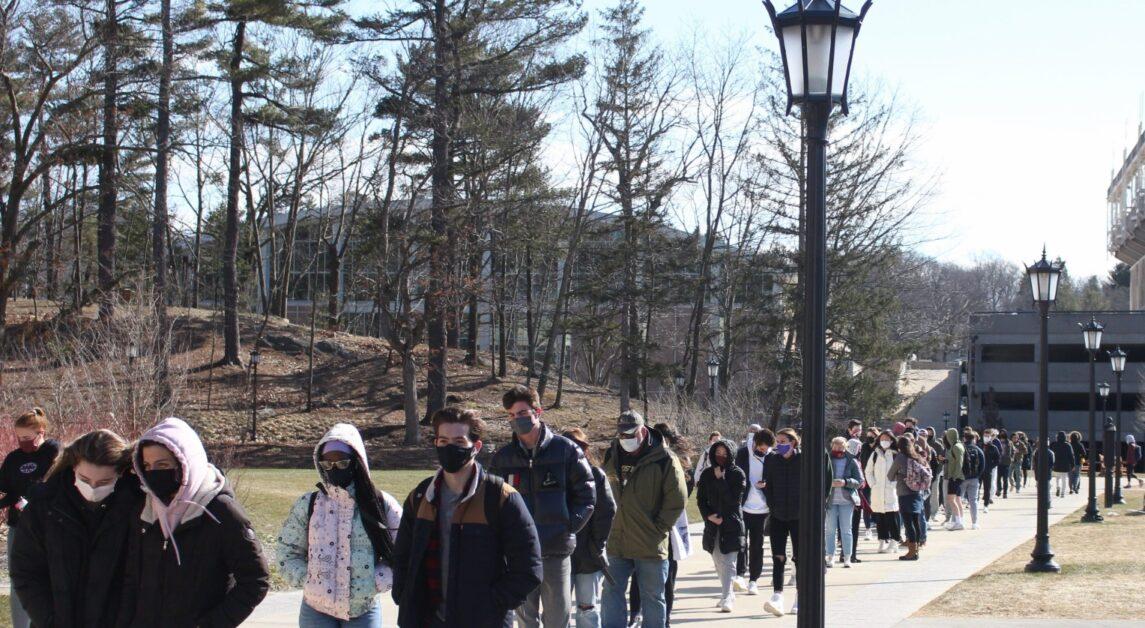“Boston College’s asymptomatic surveillance testing program is a critical component to the University’s operations and allows for fewer restrictions relative to COVID-19,” Vice President for Student Affairs Shawna Cooper-Gibson and Director of the Office of Student Conduct Corey Kelly wrote in the email.
The email states that students who cannot complete a required COVID-19 test due to “legitimate extenuating circumstances” must notify the University and upload an external PCR test within their required testing time frame.
Students who do not get tested after receiving an email from University Health Services will face multiple account holds, including a hold on their Canvas account, starting Saturday of that week. According to the email, receiving a COVID-19 test the Monday of the following week will no longer be sufficient for students to avoid a Canvas hold.
“Holds will only be removed after a student has tested (PCR) and completed an online educational module,” the email reads.
Students who do not comply will be issued a “summary suspension” and will not be allowed to return to campus, with the exception of the testing center, until completing the testing and education module requirements, according to the email. These students will also be referred for student conduct action.
In Section 2.3 of BC’s Student Code of Conduct, examples of behavior that might elicit a summary suspension include physical violence, sexual misconduct, disruption of the University’s educational or civil learning environment, significant damage to property, and possesion and distribution of controlled substances.
“The Director of Student Conduct or designee may take interim administrative action when a student is deemed to threaten the health, safety, or well-being of the University community, threaten or impair the effective functioning of the University,” the Code of Conduct states.
Students who miss two or more tests will face sanctions such as housing suspension and University suspension.
The email said the University will take additional actions against testing noncompliance if necessary during the semester—potential actions include imposing restrictions on or completely suspending on- and off-campus gatherings for all students.
Cooper-Gibson previously sent emails last semester urging students to comply with COVID-19 testing and informing students of heightened penalties for noncompliance that included housing and University suspensions, privilege restrictions—which limited students’ ability to attend campus events—and account holds.
Last semester, the University reported a total of 533 undergraduate cases of COVID-19 out of 121,736 tests performed, a positivity rate of 0.44 percent.
On Dec. 14, Vice President for Human Resources David Trainor and Director of University Health Services Douglas Comeau sent an email mandating that members of the BC community on campus for the spring semester receive a COVID-19 booster shot when eligible. Unless granted an exemption, BC community members must upload their booster card by Feb. 9.
This semester, BC predicts a high number of positive cases at the start of the spring semester due to the Omicron variant.
“With the aggressive spread of the Omicron variant across the country and globe, the University anticipates high positivity rates in our campus community early in the resumption of the 2021-2022 academic year,” the email said.
Also citing the spread of Omicron, Comeau and Trainor sent an email to students on Jan. 5 implementing new COVID-19 protocols for the spring semester.
Students must upload a negative PCR or antigen test before traveling to campus and will be tested upon arrival. Additionally, the email updated quarantine and isolation protocols to reflect new guidance from the Centers for Disease Control and imposed a temporary mask mandate until Jan. 31.
In the Tuesday email, Cooper-Gibson and Kelly urged students to help protect the University and nearby communities.
“Everyone must do their part to keep the BC and surrounding communities safe and healthy,” the email reads.
Featured Image by Steve Mooney / Heights Editor



















